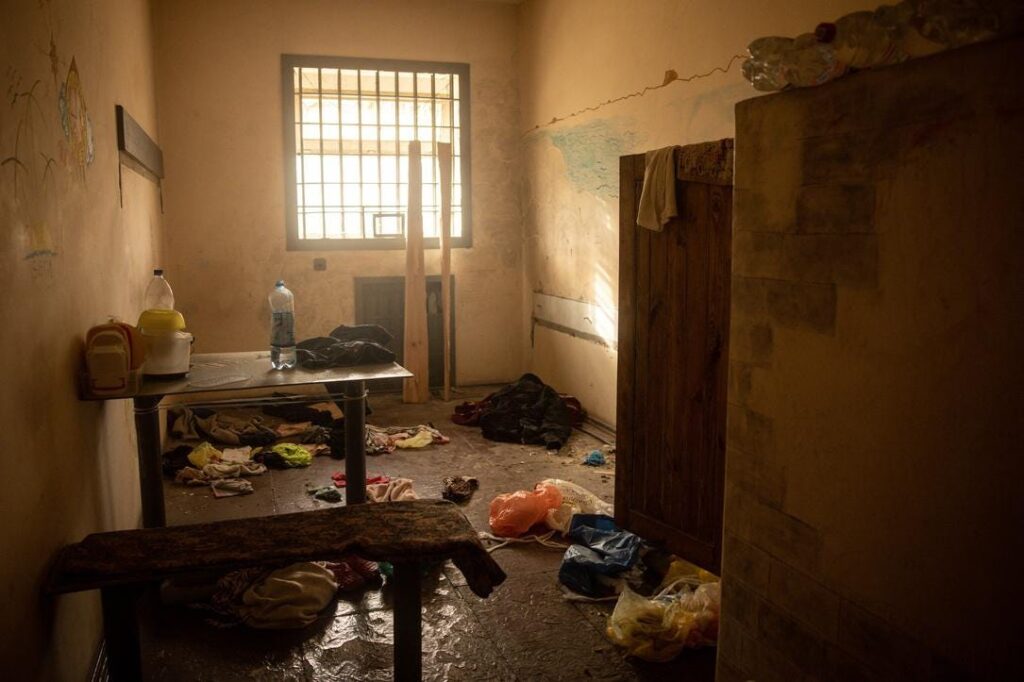KHERSON, UKRAINE – NOVEMBER 16: Items are seen inside a cell at a detention center which is believed … [+]
For months, the existence of detention centers, torture chambers, and mass graves throughout (formerly) Russian-occupied territories in Ukraine has been well-documented. And, throughout the year-long conflict, there’s been mounting evidence of Russian forces being engaged in potential war crimes. The atrocities have included direct attacks on civilians and civilian infrastructure, such as schools, residential buildings, hospitals, clinics, and other sites protected under international humanitarian law.
To illustrate, since the invasion began more than one year ago, there have been more than 700 recorded attacks on hospitals, health workers, and other medical infrastructure in Ukraine. As a result, 218 hospitals and clinics have been damaged or destroyed, as well as scores of pharmacies, blood donation centers, and dental clinics.
Today, fresh evidence released by the Mobile Justice Team points to the systematic nature in which the Russian “special military operation” intended to not only target civilian infrastructure, but also to eliminate Ukrainian cultural identity. The Mobile Justice Team is investigating possible crimes against humanity in Ukraine. The Team* consists of 25 international prosecutors and investigators and ten Ukrainian lawyers.
Documentation and testimony directly link torture chambers in the recently liberated city of Kherson to President Vladimir Putin, the Russian State and its security apparatus, including the FSB or Federal Security Service. According to Wayne Jordash (King’s Counsel), a British attorney and managing partner of Global Rights Compliance and the Mobile Justice Team Lead, the evidence shows that “genocidal tactics are baked into Putin’s calculated plan to extinguish Ukrainian identity.” The crimes carried out – from unlawful detentions to murder – were integral to the so-called special military operation. Effectively, its aim was enslavement of the Ukrainian population in areas under Russian control.
The new corroborating evidence collected from Kherson reveals that a network of torture chambers was planned and directly financed by the Russian State. Investigators identified 20 torture centers in Kherson, with more expected to be uncovered. More than 1,000 torture chamber survivors submitted testimony to investigators so far, while it’s been documented that more than 400 people have “disappeared” from Kherson. It remains unknown whether they have been killed or taken to Russian-held territory.
Electric shock torture and waterboarding are among the criminal acts described by Ukrainian men and women who were imprisoned at the torture chambers in Kherson.
Those incarcerated included persons with a connection to the Ukrainian State or civil society – ranging from military and civil servants to journalists, teachers and community volunteers. Many survivors reported being randomly stopped on the streets and detained for holding pro-Ukrainian material on their phones before being whisked away to detention centers.
According to the team of international experts, these places of torture were part of the Russian government’s calculated plan to terrorize and in the end crush Ukrainian resistance. It is highly probable that many such torture centers currently exist in the Russian-occupied areas of Ukraine.
Ukraine-Russia war toll
Conservative tallies of deaths among combatants indicate tens of thousands dead on both sides with many more injured.
In addition, the Office of the United Nations High Commissioner for Human Rights estimates the number of deaths of civilians, or non-armed individuals, in Ukraine at more than 8,000 since the start of the war. Many thousands more have been injured.
Moreover, the war has displaced approximately 6.6 million people inside the country and caused an additional 6.3 million to flee across international borders.
Accusations of war crimes committed by Russian troops run the gamut from indiscriminate shelling of civilians, to widespread looting, to the deliberate killing, torture, and rape of Ukrainians on a large scale, as well as abductions of many children. Thus far, an estimated 14,000 children have been kidnapped and transported to Russia for re-education and forced adoption since the invasion last year.
The Ukrainian cities of Bucha, Irpin, Hostomel, Izyum, and Kherson, among many others, have experienced horrific violence against non-combatants, including torture and murder. Mass graves have been discovered in many locales.
Perhaps the most visible example to the world of the atrocities committed by Russian forces was the Bucha massacre; a mass murder of Ukrainian civilians and prisoners of war[ during the battle for and occupation of the city of Bucha. In early April 2022, photographic and video evidence of the massacre emerged after Russian forces withdrew from the city.
According to local authorities, 458 bodies have been recovered from the town, including 9 children under the age of 18.
Cities that haven’t been liberated yet, such as Mariupol, were shelled mercilessly into near oblivion. If what happened in the aforementioned cities is any indication, once Mariupol is freed it too will likely be the scene of gruesome discoveries.
Systematic torture perpetrated by Russian occupiers is a common thread in the horrors that have emerged during this war. The evidence released today by the Mobile Justice Team demonstrates the premeditated strategy to stamp out Ukrainian cultural identity. This includes evidence regarding carefully thought out plans to establish, manage and finance torture centers used to beat into submission, re-educate, and even kill Ukrainian civic leaders and ordinary dissenters.


